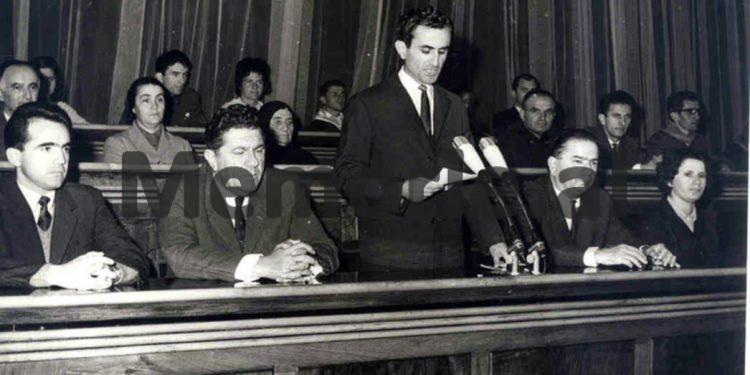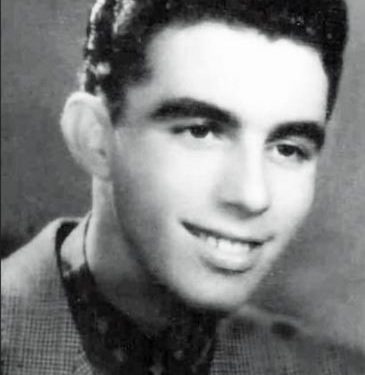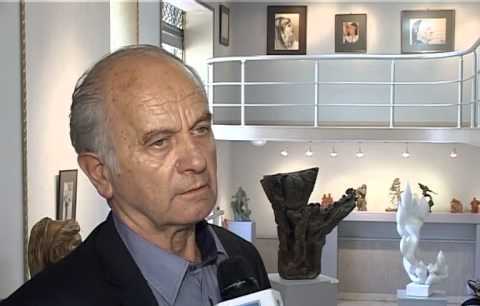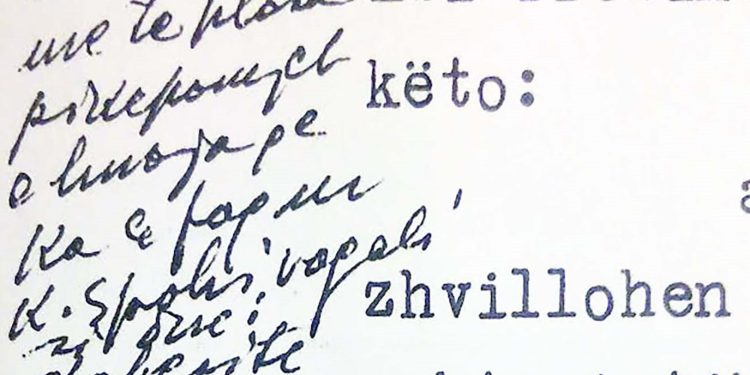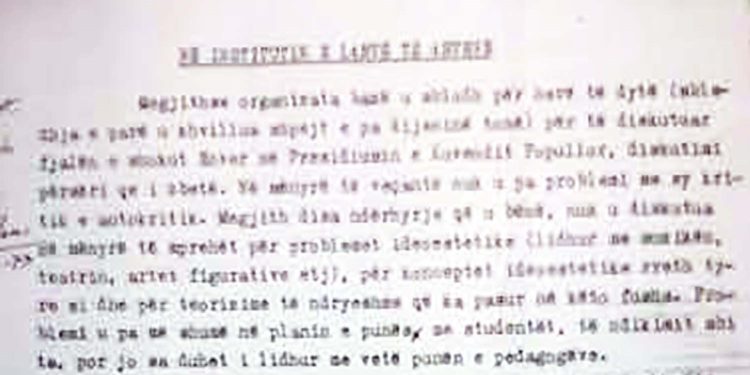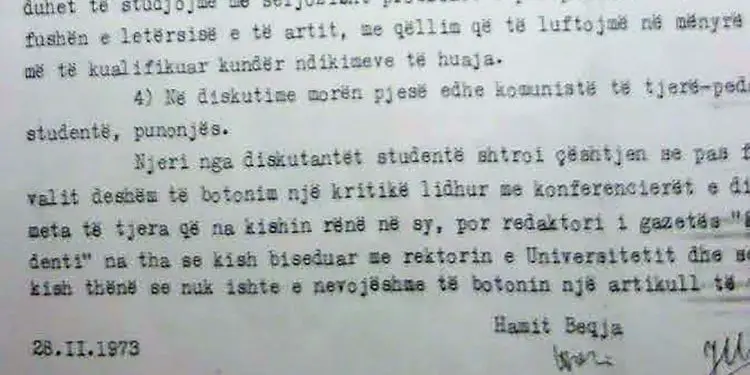By Dashnor Kaloçi
– This article is published as a tribute to Mr. Agim Mero, former rector of the State University of Tirana, who passed away at the age of 91 and yesterday (19.XI.2024), was taken to his last residence –
Memorie.al / The archival document that we are publishing in this article is an information report, dated February 28, 1973, where the instructor of the Central Committee of the ALP, on the problems of Education and Culture, Professor Hamit Beqja, informs the secretary of the Central Committee, Hysni Kapon, regarding the problems that had emerged from the analysis made at the High Institute of Arts in Tirana, which at that time, but also after, was seen and considered as; “the hearth of liberalism”.
What is noticeable at first glance about this document is that the information is not sent to Ramiz Ali, the secretary of the Central Committee that covered Art, Culture and Propaganda, as was usually the case with documents of this nature, but it was sent to Hysni Kapo. , the secretary of the Central Committee of the ALP, which covered the bodies of the “Dictatorship of the Proletariat”, such as: the Ministry of Defense, the Ministry of the Interior, the State Security, the Prosecutor’s Office, the Investigation, the Police, etc.
From the way this work practice has worked, this happened in cases where the problem being discussed was quite acute and that thing was no longer an “object”, only of the Art and Culture sector, but of the organs of the Dictatorship of the Proletariat. So, to put it more clearly, when it came to punishing someone, as it really happened with Kujtim Spahivogli, (who is mentioned in this report-information and there are relevant notes about him), who was interned in the district of Fier, where he worked for for years, as a shovel worker and in loading and unloading, at a construction site.
Or with the rector of the State University of Tirana, Agim Mero, who, shortly after that meeting, was fired from the position he held for years and was expelled from Tirana, being sent with his whole family to the city of Laçi Kurbini, (so at that time part of the district of Kruja), where he worked as a construction technician, until March 1991, when he was elected deputy of the People’s Assembly, proposed by the Democratic Party.
Another thing that can be noticed in the document in question, compiled by Hamit Beqja, is that the discussions of lecturers or other persons, who took part in the analysis made at the High Institute of Arts, were somewhat soft, not very problematic and without concrete accusations and denunciations.
With the exception of the critic Razi Brahimi, known before the 90s as a communist very fanatical towards the “Party line”, or as it was said at the time; “with high partisanship”, who, as it appears from the document in question, has put the “dots on the i” and has spoken concretely, not only about some writers and artists, but also about the Minister of Education and Culture, Thoma Deljana. This is clear from the document in question, which we are publishing in full and without any cuts.
ARCHIVE DOCUMENT WITH THE REPORT-INFORMATION OF THE INSTRUCTOR OF THE ALP CENTRAL COMMITTEE, HAMIT BEQJA, SENT TO HYSNI KAPOS, REGARDING THE MEETING HELD AT THE HIGHER INSTITUTE OF ARTS
IN THE HIGHER INSTITUTE OF ARTS
Although the basic organization met for the second time (the first meeting took place quickly, without our knowledge), to discuss Comrade Enver’s speech, at the Presidium of the People’s Assembly, the discussion again faded. In particular, the problem was not seen with a critical and self-critical eye.
Despite some interventions that were made, it was not discussed in a sharp way about the ideo-aesthetic problems around them as well as about the various theorizations that have existed in these fields. The problem was seen more in terms of working with students, influencing them, but not sufficiently related to the work of the lecturers themselves.
Even about the discipline, order and progress in the school, the discussion was not sharp, especially if we take into account the fact that in this school, in the last two or three years, there have been big debates, including theorizing about democracy, which have negatively affected the discipline of weakening the rule.
- However, in the discussions about the work, some important problems were also raised with the students:
There is no proper unity between the teaching work and the formation that the student receives, outside of the lesson. Other things are taken in the curriculum and others from reading, from free acquaintance with music and visual arts, from television programs, etc.
- Educators do not know this life of students well, so even many influences that are placed on them do not become the object of active and critical confrontation. Therefore, it is not surprising that students, who just start school, happen to show creative influences, which as a rule they did not receive during the curriculum.
- This is also influenced by the students’ deep ignorance of foreign aesthetic currents, which are talked about in general, in terms of history and theory, but without characterizing and dissecting their interior and peculiarities, and even more so without demonstrating this with works concrete.
- A qualified job is not done to help students how to work with the literature made available (musical, theatrical, painting, etc.), to help them look at it with a critical eye, to choose what they want can help them more.
- It was pointed out that in the dormitory life, apart from the phenomena of in-discipline, characteristic for other students as well, some other strange phenomena are observed among the students of this school in the tendencies to hang inappropriate paintings in the room, to listen excessive foreign music, to excessively watch foreign television programs, etc., etc.
It was emphasized that the in-discipline in some cases even to such extreme manifestations, such as not coming to the political class, etc.
– Even from the presentation of the discussions of some communist pedagogues, the weakness of the debate, criticism and self-criticism emerges.
1) Kujtim Spahivogli made a very general discussion on the dangerousness of foreign influences. As a concrete remark, he only said the following:
(In this paragraph, next to him, Hysni Kapo has made this note, with his writing: “The foreign views that K. Spahivogli has shown should have been more complete, as in the weaknesses in the work of the Party and the youth. Attitudes and the ugly performances of students and the opportunistic attitude of cadres and communists”.
- a) In the staging of the drama “Viti ’61”, in the scenes that take place outside, clothes and cuts are seen that were not actually characteristic for that time, but which, it seems, have become fashionable.
- b) A young playwright brought us a play, which in terms of dialogue and form was influenced by Samuel Beckett, after realizing this defect; we gave up on this play.
- c) There are modernist influences in the decor.
2) Muntaz Dhrami, although he criticized K. Spahivogli’s discussion as general, did not make any sharp discussion himself. The discussion of the other sculptor, Shaban Hadër, was of this nature.
3) A responsible discussion, made by Razi Brahimi. He emphasized that the majority of our pedagogues (creators and critics) have held fair positions in public discussions and in the press, and have tried to fight against decadent modernist foreign influences. But there is no room for complacency. Even our responsibility for the performances that are criticized is great. Dissatisfaction towards unpleasant phenomena has appeared in our conversations. But our persistence to fight them has not been what it should be.
We have had enough of small talk. Several times we have been reserved, thinking that we should not identify the person with the party. So, on the second day of the festival, I happened to meet with the Minister of Education (Thoma Deljana, our note), I saw that he also had remarks about it. But when you see that he doesn’t even look at the remarks, reservations may arise. Also, we have had the opportunity to criticize that they don’t attack us, so; we have shown ourselves to be microbourgeois.
There have been liberal tendencies, especially in the press and in the “Drita” newspaper. When it was suggested to him to concretize this criticism, he mentioned Xhevahir Spahi’s poem, which was criticized by Comrade Enver, Faslli Halit’s poem “The Sun and the River”, published in the newspaper “Zëri i
Rinija”, the poem “Fiku dhe deti” and others that he himself has criticized, Sabri Godo’s stories, which were not published years ago and yet were recently published, etc.
Some critics, such as Adriatik Kallulli, Kudret Velça, Dalan Shapllo, Koço Bihiku and Ali Abdihoxha, have begun to write less and to write more. This comes as a result of the unhealthy atmosphere; especially they are not welcome in the “Drita” newspaper. “November” magazine in recent years has created a healthier atmosphere, while “Drita”, less so.
The liberal spirit has also been influenced by the baseless praise of young poets, without differentiating them: this has also been influenced by the experienced friends of the League. In the end, he emphasized the issue that; we break new ground and we must study more seriously the problems of perspective in the field of literature and art, in order to fight in an even more qualified way against foreign influences.
4) Other communist lecturers, students and employees also participated in the discussions. One of the student discussants raised the issue that after the festival, we wanted to publish a criticism about the conference speakers (Bujar Kapexhiu and Edi Luarasi, our note) and some other flaws that had caught our eye, but the editor of the newspaper “Studenti “, he told us that he had talked with the rector of the university (Agim Mero, our note) and that he had told him that; there was no need to publish such an article. Memorie.al
28. II. 1973
Hamit Beqja




